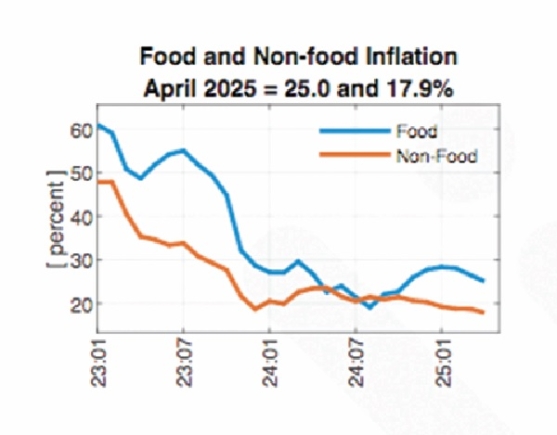Ghana is poised for a significant drop in its inflation rate over the next two years, according to a report by UK-based research firm Fitch Solutions.
The report, released recently, projects that inflation will fall from an average of 22.9 per cent in 2024 to 18.8 per cent in 2025, marking a substantial easing of price pressures that have gripped the country’s economy in recent years.
President John Mahama stated that his goal for economic reset would be supported by exchange rate stability and tighter monetary policy measures.
He said this at the Ghana-EU Business Forum held in Accra.
"Inflation, which peaked at 23.8 per cent at the end of 2024, has begun to ease, falling to 21.2 per cent in April 2025 largely due to moderation of both food and non-food inflation and prudent fiscal management. We are projecting to achieve single-digit inflation trajectory by the middle of 2026,” he said.
Fuel and food
Fitch Solutions attributes the expected decline in inflation to a combination of global and domestic factors.
Among these is the forecasted easing of global oil prices, which is set to have a ripple effect on Ghana’s local economy.
The report suggests that the National Petroleum Authority (NPA) will be able to stabilise or even reduce retail fuel prices as global oil markets cool, helping to ease household expenditure pressures.
“Lower oil prices will enable the NPA to stabilise or reduce retail fuel costs, thereby alleviating pressure on consumer spending, the projected reduction in fuel costs comes as a welcome relief for many Ghanaians, who have had to grapple with soaring fuel prices in recent years, which have in turn pushed up transportation and food prices.”
Improved food supply is also expected to play a key role in easing inflation.
With better harvests and agricultural production, food prices, as one of the main drivers of inflation in Ghana, are likely to stabilise, further supporting the decline in inflation rate.
Cedi stability
In addition to lower oil prices and improved food supply, rising gold prices are expected to strengthen Ghana’s foreign reserves and provide much-needed stability for the cedi.
Ghana as one of the world’s top gold producers, stands to benefit from a buoyant global gold market, which Fitch says will help shore up the Bank of Ghana’s reserves and curb imported inflation.
“Rising gold prices are expected to strengthen the Bank of Ghana’s reserves, stabilising the cedi and curbing imported inflation,” the report said.
This combination of factors, fuel price relief, improved food supply and a stronger cedi will help ease household budget constraints.
It is expected to support private consumption, which the research firm forecasts will grow by 4.0 per cent in 2025, contributing 3.2 percentage points to Ghana’s overall economic growth.
Inflation to ease further
Fitch Solutions anticipates an even brighter picture for Ghana’s economy in 2026, forecasting inflation to decline further to an average of 15.2 per cent.
The firm expects that this continued easing of inflation will enhance consumer spending power, giving households more breathing room after years of high inflation.
Fitch also highlighted the ongoing $3 billion Extended Credit Facility programme with the International Monetary Fund (IMF), which is set to conclude in May 2026.
The programme has been key to Ghana’s economic recovery efforts, providing crucial financial support and policy guidance to stabilise the economy.
